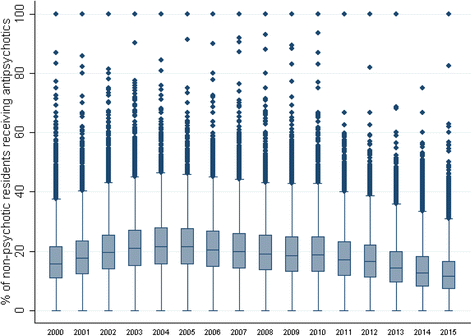Pragmatic trials may help to identify effective strategies to reduce nursing home antipsychotic medication use
- PMID: 28149500
- PMCID: PMC5270358
- DOI: 10.1186/s13584-016-0130-3
Pragmatic trials may help to identify effective strategies to reduce nursing home antipsychotic medication use
Abstract
Despite widespread agreement that nursing homes' use of antipsychotic medications for residents without specific psychiatric diagnoses is a marker of poor quality of care, prevalence remains high. Additionally, variation suggests continued opportunity to improve care even in countries, like the United States, that have long-standing policies designed to decrease antipsychotic medication use. In a recent Israel Journal of Health Policy Research article, Frankenthal et al. presented results linking increased antipsychotic medication use prevalence in Tel Aviv nursing homes with facility characteristics, including some that "undermine quality of care," and called for increased national focus on this area. While we agree with the authors that government focus can help to decrease antipsychotic medication use, experience in the United States shows that such efforts may not be sufficient: we present data showing significant variation among United States nursing homes' antipsychotic medication use prevalence after more than ten years of national warnings and programs. This suggests that United States nursing home clinicians and caregivers continue to need effective non-pharmacologic interventions to substitute for antipsychotic medications. We suggest expanded use of cluster-randomized trials to test strategies to withdraw residents from antipsychotic medications and to implement alternate, non-pharmacological approaches for addressing the behavioral and psychological symptoms of dementia.
Keywords: Antipsychotic medications; Chemical restraints; Dementia; Nursing homes; Quality.
Figures
Comment on
-
The impact of facility characteristics on the use of antipsychotic medications in nursing homes: a cross-sectional study.Isr J Health Policy Res. 2016 Mar 16;5:12. doi: 10.1186/s13584-016-0070-y. eCollection 2016. Isr J Health Policy Res. 2016. PMID: 26985361 Free PMC article.
References
-
- U.S. Department of Health & Human Services, U.S. Food and Drug Administration. Public health advisory: deaths with antipsychotics in elderly patients with behavioral disturbances. 2005. Available from: http://www.fda.gov/Drugs/DrugSafety/PostmarketDrugSafetyInformationforPa.... Accessed 25 July 2016.
-
- Foebel AD, Liperoti R, Onder G, Finne-Soveri H, Henrard JC, Lukas A, Denkinger MD, Gambassi G, Bernabei R. SHELTER study investigators. Use of antipsychotic drugs among residents with dementia in european long-term care facilities: results from the SHELTER study. J Am Med Dir Assoc. 2014;15(12):911–7. doi: 10.1016/j.jamda.2014.07.012. - DOI - PubMed
-
- Foebel A, Ballokova A, Wellens NI, Fialova D, Milisen K, Liperoti R, Hirdes JP. A retrospective, longitudinal study of factors associated with new antipsychotic medication use among recently admitted long-term care residents. BMC Geriatr. 2015;15:128. doi: 10.1186/s12877-015-0127-8. - DOI - PMC - PubMed
Publication types
MeSH terms
Substances
LinkOut - more resources
Full Text Sources
Other Literature Sources


